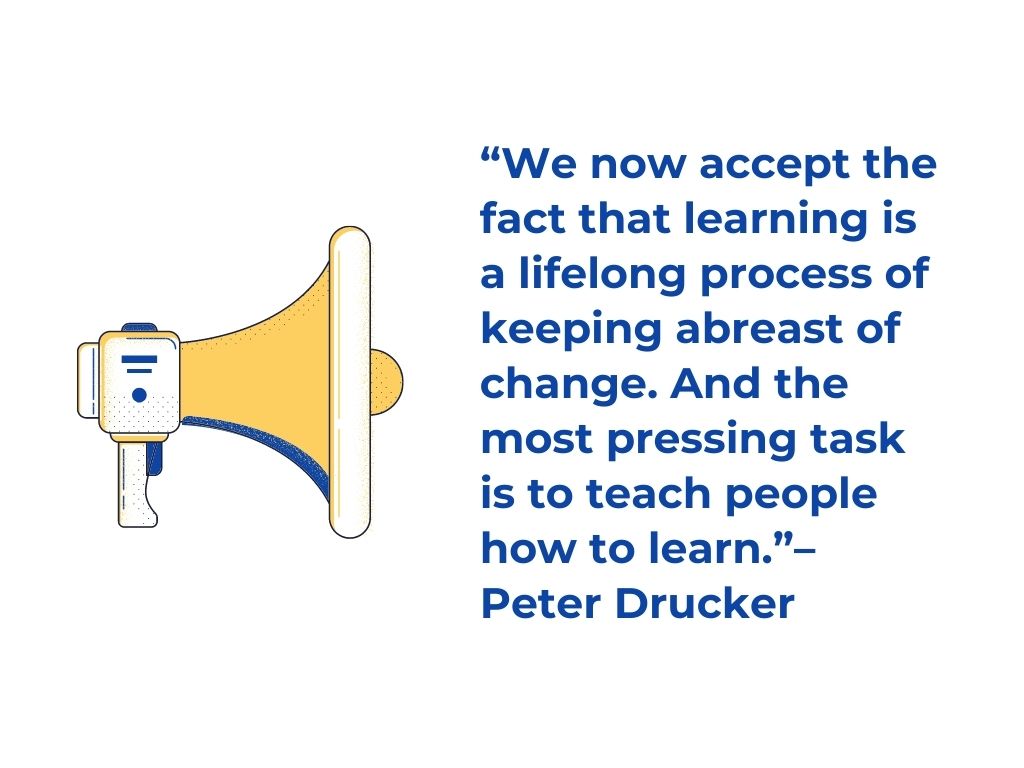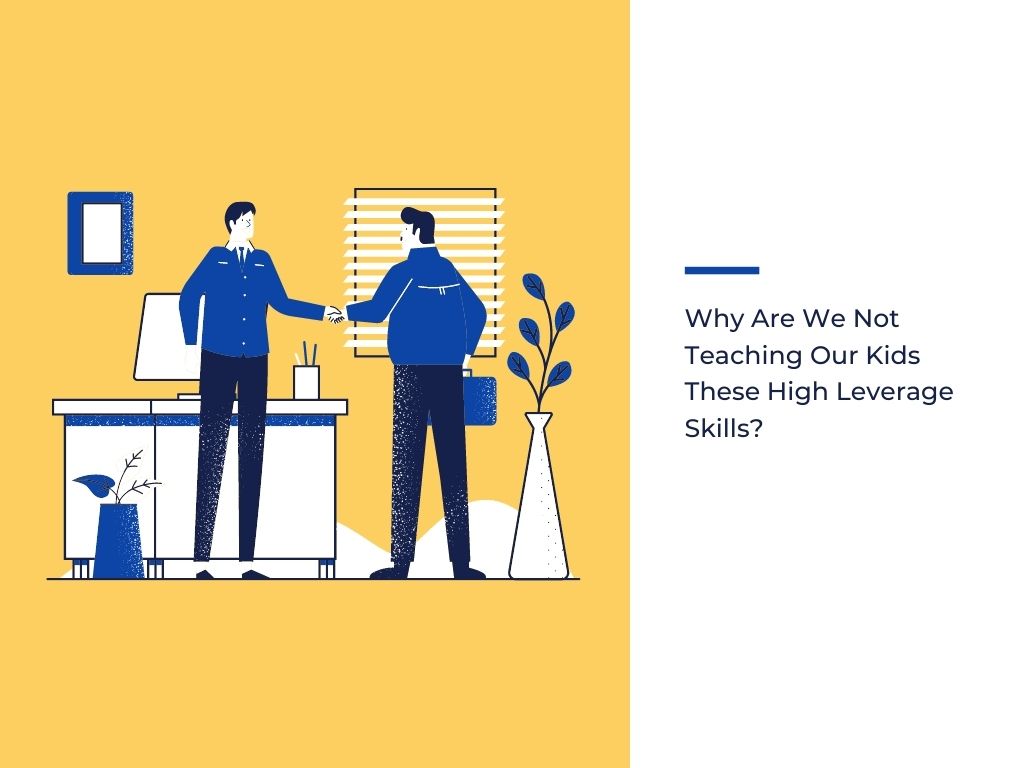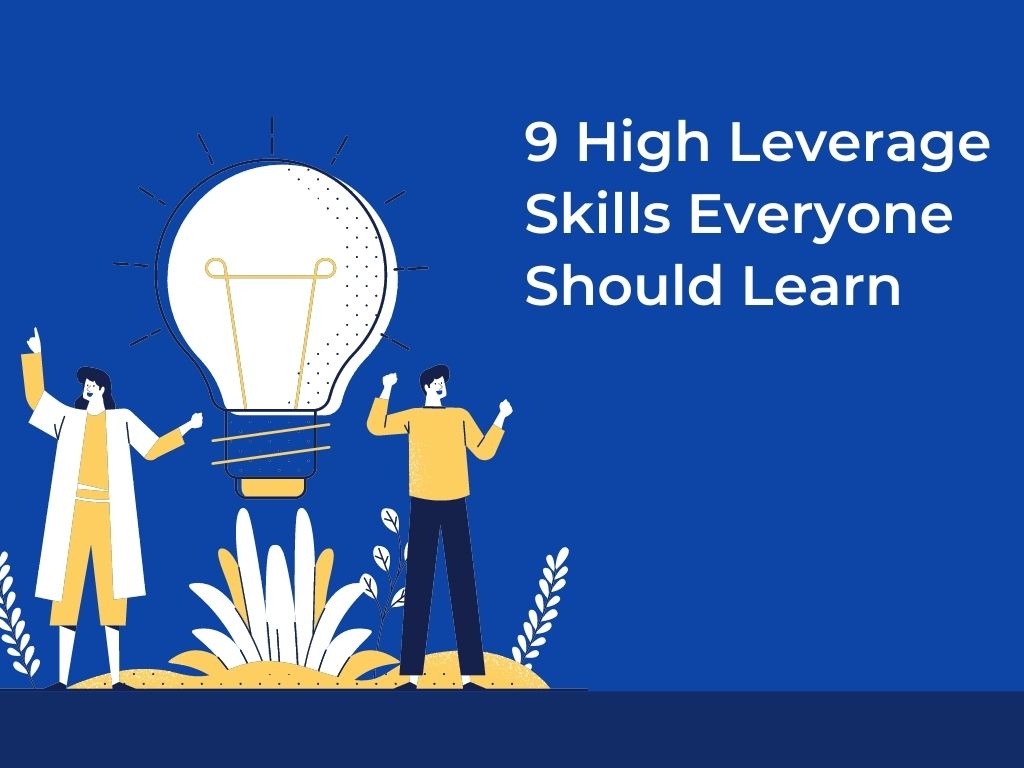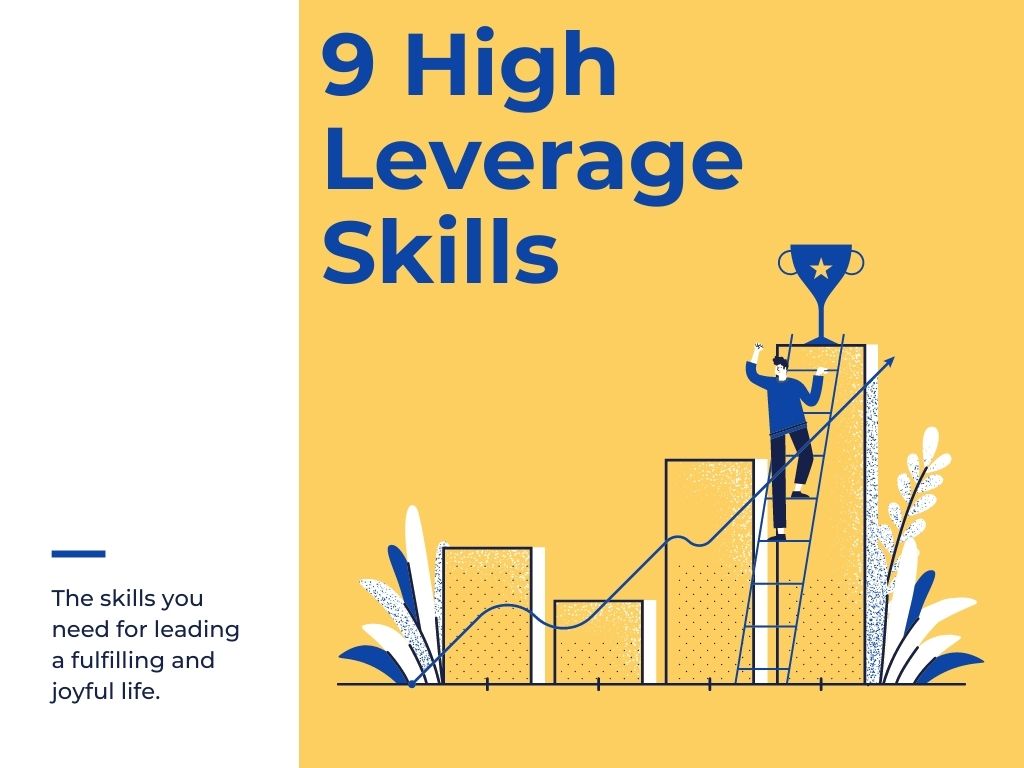“It’s not only children who grow. Parents do too. As much as we watch to see what our children do with their lives, they are watching us to see what we do with ours. I can’t tell my children to reach for the sun. All I can do is reach for it, myself.” – Joyce Maynard
From a young age, children are taught various things. However, most of the knowledge is centered on academic progress. There are hardly any courses that teach them the skills for leading a fulfilling and joyful life.
Conventional knowledge can make a child successful in the professional world years down the line. But to be happy and content, they need to learn a set of skills that can help them no matter the field they step into. I have found that the below 9 skills are rarely taught in our formal education systems, yet are very important.
These high-leverage skills are important no matter what you do for work, and can amplify the results you produce. Considering how valuable these skills are in my life, I found it very surprising that we don’t teach these skills as part of our formal education.

1. The Art of Communication
Good communication skills are necessary for producing results and breaking down barriers between people. At the same time, the old adage – we have two ears and one mouth- is of great importance. To communicate well, we need to be good listeners first.
It is ok for two people to disagree on a subject. But disagreement does not have to lead to a conflict or a breakdown in communication. People disagree when they have different perspectives, and it becomes a problem when they get stuck there rather than going deeper to find shared goals.
How to disagree, understand each others’ points of view, and coming up with a win-win solution that works for both parties is a very important skill irrespective of what you do and where you work. Yet it is never taught and we are left to learn from our own experiences.
When people care about the other person’s point of view, it leads to a better understanding of their feelings. That results in the development of tolerance and acceptance of others in them. In other words – empathy. Empathy not only helps to bring people together but also results in more fulfilling relationships.
2. The Importance of Asking Questions
I remember that as a kid, I used to have so many questions at all times. No wonder I kept troubling my mother all the time. The range of questions that children come up with is simply amazing!
Genuine inquiry can bring about so much learning and knowledge rather than having definite answers or ideas. Questions can open the mind to new ideas. On the other hand, the doors to knowledge get blocked once children grow up and eventually stop asking questions.
While definite answers lead to the end of learning, a good question heralds the beginning of new learnings and opportunities. Hence asking powerful questions is a very important skill that we are never taught. Instead, we are too obsessed with finding answers that we rarely stop to question.

3. Being Ok With Not Knowing
“I see my path, but I don’t know where it leads. Not knowing where I’m going is what inspires me to travel it.” – Rosalia de Castro
If we genuinely look at the vast universe around us, we will realize our knowledge is minuscule. When we admit “I do not know” it opens up a pathway towards learning. But I have observed that saying “I do not know” is a tough task for many people, and it is seen as a bad sign – both in school and at work.
The competitive themes woven in the fabric of modern society does not encourage individuals to admit their ignorance. It teaches us that any gaps in our knowledge should be hidden or filled up at the earliest. However, the person who knows everything is like the proverbial filled cup that can only overflow and not learn anything new.
By refusing to acknowledge our ignorance we are blocking our passage towards knowledge. Mostly “I do not know” is perceived as a negative statement. But we need to change our outlook and see it with a growth mindset and curiosity. That transforms a person into a true seeker and leads to real self-development.
To let people explore and find the truth like children, we need to encourage the culture of saying “ I do not know”.
4. Not Seeking Approval From Others
Many times, we are busy, consciously or subconsciously, winning approval from others as that makes us happy. But keep in mind that this desire to seek approval from others is a kind of bondage, which kills the freedom to grow and develop as a confident individual.
The need for approval can lead to fear, anxiety, and stress. This can prevent people from moving beyond their self-imposed boundaries in life.
Once people develop self-belief stop worrying about what others think, they are free to create their life the way they want. It is important to teach people that their lives are their own making based on their choices. Opinions and social pressure should not hold back their individuality.

5. Overcoming Negative Emotions
“Resentment is like drinking poison and then hoping it will kill your enemies.”- Nelson Mandela
All of us have been overcome with anger, grudges, or emotional pain at some point in our lives. When we feel wronged or offended, our ego takes the driver’s seat, killing any possibilities for learning.
The truth is, negative feelings do more damage to ourselves than to the other person. When we let go of the past and move on, there is a sense of peace that rises from within. With no emotional baggage to weigh us down, we can move freely and joyfully through life. It also allows us to focus our time and energy on issues that truly matter to us.
Just like the waste generated in our households and cities is processed to create energy, we can and must process our emotional waste too. If we know how to deal with our emotions, they can be used to generate productive energy.
Learning to transform emotional waste into creative energy for a common or higher purpose is a skill. And just like other skills, it can be learned and developed. We can all use our emotional intelligence to make productive use of our emotions. If we can do that, these emotions will stop being “negative” for us. And we will end up with stronger relationships and a better world for all of us – not just you and me.
6. The Importance of Integrity
Take a moment to look back and think – Have you always done what was expected of you even when nobody was around to check what you were doing? How many times have you gone back on a promise because you were tired, or not in the mood?
Integrity is a quality that deeply impacts every other aspect of our lives. This is an age where material success and fame seems more important than integrity.
The word integrity can mean multiple concepts like honesty, honor, responsibility, and authenticity. But simply said, integrity is doing what you say and saying what you do. Integrity is honoring your word and keeping your promises. Yet we rarely teach people the value of integrity and the high costs associated with not acting in integrity.
Integrity leads to trust between people, higher self-esteem, better reputation, and bigger results for us. At the same time, a lack of integrity can lead to distrust, anxiety, lack of confidence, and diminished results over the long term.
Here is something Warren Buffet said- “You’re looking for three things, generally, in a person – intelligence, energy, and integrity. And if they don’t have the last one, don’t even bother with the first two.”

7. To Remain Balanced Through Life
“No man has been shattered by the blows of Fortune unless he was first deceived by her favours.” – Seneca
Life can be a seesaw of success and failure. This can lead to alternative cycles of pain and pleasure. In reality, none of these situations are permanent. We must be careful not to get carried away by them.
The true nature of human consciousness can be compared with a clear blue sky. The various events of life are the white and dark clouds that pass over that sky. Once we realize our true nature, the passing clouds cannot affect our state of being.
While failure can lead to anger, frustration, anxiety, and depression, success can lead to arrogance, pride, and egotism. To maintain the right emotional balance, we need to avoid both ends of the spectrum.
The Bhagavad Gita talks about staying the same in joy and sorrow. It says that the problem does not lie in the joy or sorrow as everyone goes through ups and downs in life. Pairs of opposites are everywhere – in the outside world, and in your mind. But you do not need to be attached to either joy or sorrow. You can learn to stay balanced and act in a constant way irrespective of them.
8. Stepping Out of the Comfort Zone
“Get out of your comfort zone. Seek discomfort. Make sure the weakest parts of you don’t survive.”- Robert Celner
Consider these examples:
- Richard Branson did not enjoy public speaking and used to get nervous about it. He had to step out of his comfort zone to master the art.
- An editor fired Walt Disney and remarked that “he lacked imagination and had no good ideas.” Before he built Disneyland, Disney had to face bankruptcy multiple times.
There are many other celebrities who stepped out of their comfort zones and took risks to accomplish what they believed in. Trying out new things and embracing new ideas is a must when you want to enrich your experience of life. Also, it is fine to face failure in your new path. Every failure can add a new chapter of lessons in the book of life.
Fear is an effective tool designed by nature for our self-preservation. Even then, overcoming a fearful mind and taking calculated risks is necessary for exploring new horizons in life. The most successful people have faced fear in their lives. But that did not make them compromise with the goals and objectives they considered most important.
9. Embracing Life in Every Moment
“Children have neither a past nor a future. Thus they enjoy the present, which seldom happens to us.” – Jean de La Bruyère
Children have a natural ability to be joyful in the present moment. They dance through life and embrace every moment. They take each moment as it happens, and don’t try to control everything as we adults do.
In reality, the past and the future exist only in our minds. All we have is the current moment. Most of our anxieties, fears, and worries exist in the past and the future. The flutter of life often makes us forget the importance of embracing the present moment- the Now.
Each day determines the quality of our lives. The innumerable moments that we live make up these days. So happiness is not to be found in the future. Our ability to accept the present moment and make the best out of it determines how happy we are.
In our constant search for security and safety, we tend to forget that life is inherently unpredictable. Even our best efforts can not ensure that events will turn up the way we want. So it is important to be flexible, which makes us ready to accept and dance along with the various surprises of life.
Conclusion
I strongly feel that our education system needs a reform. The 21st century looks vastly different from the last one, yet our schools and classrooms are exactly the same as they were a hundred years ago. We are still teaching our children math and science, and turning them into good workers and engineers.
While there is nothing wrong with that, most people today don’t work in factories. Today, people work with their brains more than their hands, and talk and interact with people from different continents, cultures, and languages almost every day. Hence, along with math and science, the above mentioned 9 skills like communication and empathy are very important.
These high leverage skills can be like seeds which can be planted in the minds of children at a very young age. And over time, these seeds can grow into healthy trees which give the fruits of a just, empathetic, and prosperous world – where we succeed together rather than in our own little echo chambers.
